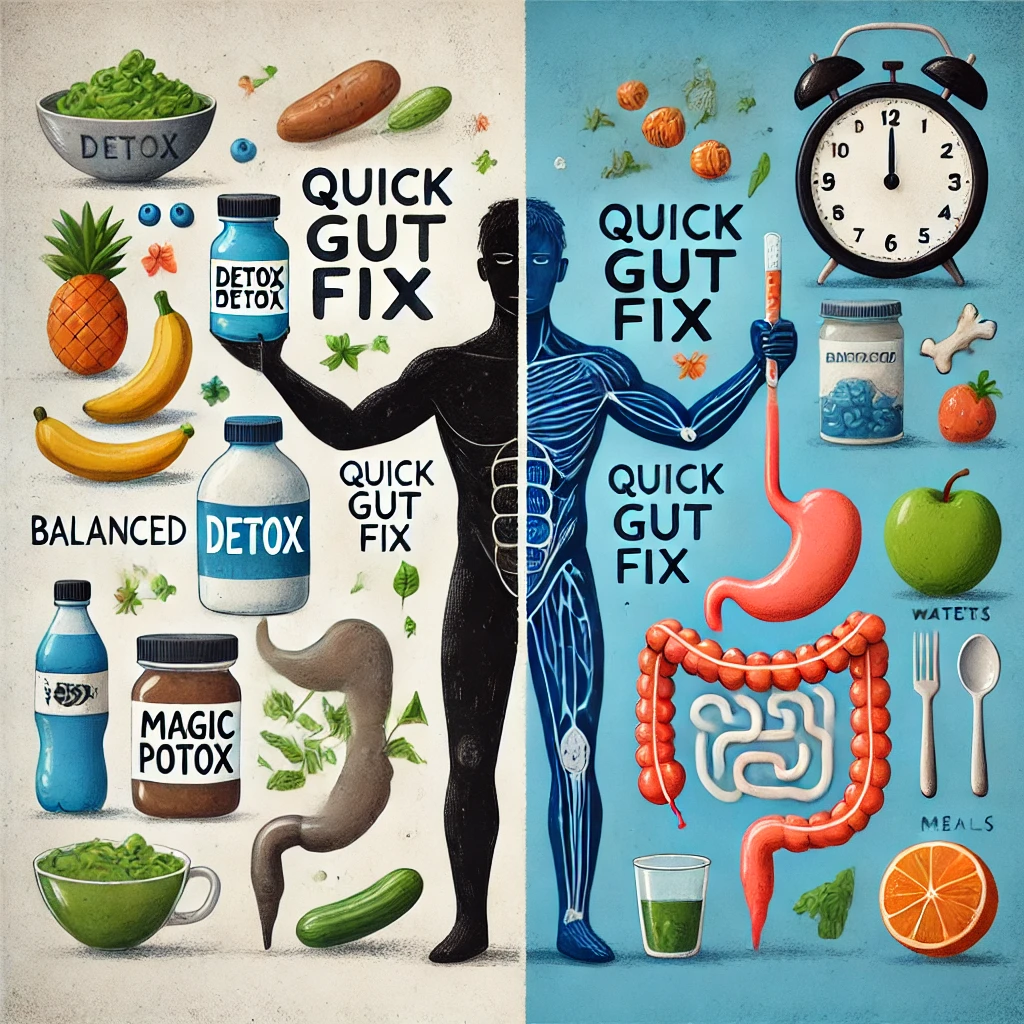
Gut health is a hot topic, but with the rise of interest comes a flood of misinformation. To truly support your digestive system, it’s essential to separate fact from fiction. Below, we debunk seven common gut health myths and provide evidence-based insights to help you make informed decisions.
Misconception #1: Detoxes and Cleanses are the Key to Gut Wellness
Detoxes and cleanses get a lot of hype for promising to flush out toxins and reset your digestive system, but it’s not that simple. Your body already has organs—like the liver and kidneys—that are pros at eliminating waste and spending money on expensive detox products. Not necessary.
The potential risks associated with these detoxes can be concerning. They can lead to dehydration, electrolyte imbalances, and nutrient deficiencies, which does not favor your gut.
A more sustainable approach is focusing on a well-balanced diet. Think about eating plenty of fiber, fruits, and vegetables and drinking enough water. This promotes good gut health naturally and safely.
You don’t need to buy into marketing gimmicks to keep your gut happy. Trust your body’s natural processes and make choices that support them.
Misconception #2: All Bacteria in the Gut are Harmful

Bacteria often get a bad rap, mainly because of their association with illnesses. But not all bacteria are out to get you; your gut is home to trillions of beneficial bacteria crucial for your health. These good bacteria help with digestion, produce essential vitamins, and fend off harmful pathogens.
Diversity is key to a healthy gut. A diverse and balanced microbiome supports overall well-being, strengthens your immune system, and enhances your mood. This means you don’t want to wipe out all bacteria; you want to encourage the good ones to flourish.
So, how do you foster this healthy environment? Maintain a varied diet rich in fiber, fruits, and fermented foods like yogurt and sauerkraut. These foods help feed the beneficial bacteria in your gut, allowing them to thrive and keep the bad guys in check.
If you’re considering probiotics, look for those with various strains to support a balanced microbiome. And remember, lifestyle factors like stress, sleep, and exercise also play a significant role in maintaining this delicate balance.
Misconception #3: You Must Go Gluten-Free for a Healthy Gut
Going gluten-free has become quite trendy, but unless you have celiac disease or gluten sensitivity, it’s not a necessity for gut health. This common myth can lead to unintended health consequences.
People who must avoid gluten have a legitimate medical reason—a reaction that can damage their intestines. For those without these conditions, eliminating gluten unnecessarily can result in nutrient deficiencies. Many gluten-containing foods contain fiber, vitamins, and minerals, contributing to overall health.
A balanced diet is more effective for promoting a healthy gut. Whole grains containing gluten offer vital nutrients that support digestion and overall wellness. If you’re ditching gluten without medical guidance, you could be missing out.
So, unless you’ve been medically advised to go gluten-free, keep enjoying those whole grains alongside other nutrient-rich foods. It’s all about balance and variety.
Misconception #4: Diet Alone Dictates Gut Health
Diet is a big player in gut health, but it’s not the only one. Several factors work together to determine the state of your digestive system. Stress, sleep, physical activity, and even your surroundings all have a significant impact.
- Chronic stress can alter your gut microbiome, leading to issues like irritable bowel syndrome (IBS) and other digestive problems. Getting a handle on stress through techniques like meditation, exercise, and even hobbies can make a big difference.
- Sleep is another critical factor. Poor sleep can disrupt the balance of gut bacteria, causing inflammation and other health issues. Aim for consistent, quality sleep to keep your gut happy.
- Physical activity also plays a vital role in maintaining a healthy gut. Regular exercise promotes better digestion, reduces inflammation, and supports a balanced gut microbiome. Whether walking, yoga, or more intense workouts, aim to be active most days of the week.
In addition to diet, taking a holistic approach that includes stress management, adequate sleep, and regular physical activity is key to maintaining optimal gut health.
Misconception #5: Probiotics are One-Size-Fits-All
Probiotics have gained popularity for their potential to improve gut health, but not all probiotics are created equal. Different strains of probiotics serve different functions, and what works for one person may not work for another.
For instance, some probiotic strains may help with general gut health, while others are specifically targeted at issues like irritable bowel syndrome (IBS), lactose intolerance, or antibiotic-associated diarrhea. This means that taking a generic probiotic supplement may not address your specific needs.
When choosing a probiotic, it is important to select one tailored to your particular health concerns. Consulting with a healthcare professional can help you identify the right probiotic strains for your needs. Additionally, remember that probiotics are most effective when paired with healthy lifestyle choices and a nutritious diet.
It’s also important to note that probiotics are not a cure-all. They should be part of a broader approach to gut health, including a balanced diet, stress management, regular exercise, and adequate sleep. By taking a comprehensive approach, you can create an environment that supports a healthy and diverse gut microbiome.
Misconception #6: Fiber is the Only Nutrient You Need for Gut Health
Fiber is undoubtedly important for gut health, but it’s not the only nutrient that matters. While fiber helps regulate bowel movements, feeds beneficial bacteria, and promotes overall digestive health, other nutrients also play crucial roles.
For example, polyphenols—antioxidants found in foods like berries, tea, and dark chocolate—support the growth of good bacteria in your gut. Omega-3 fatty acids, found in fatty fish and flaxseeds, have anti-inflammatory properties that can benefit your gut lining. Vitamins and minerals like vitamin D, zinc, and magnesium are also essential for maintaining gut integrity and supporting the immune system.
Relying solely on fiber without considering other nutrients can lead to imbalances and may not provide comprehensive support for your gut health. Instead, aim for a varied diet with a wide range of nutrients from different food groups to ensure your gut receives all the necessary building blocks for optimal function.
Misconception #7: You Can’t Improve Gut Health if You’ve Had Antibiotics
Antibiotics are necessary for treating bacterial infections, but they can also disrupt the balance of your gut microbiome by killing off beneficial bacteria. This disruption has led to the misconception that once you’ve taken antibiotics, your gut health is permanently compromised.
The good news is that you can restore and improve your gut health after antibiotics. It may take some time, but you can help your gut microbiome recover with the right steps.
Focus on consuming a diet rich in prebioticsDiversity is key to a healthy gut. A diverse and balanced microbiome supports overall well-being, strengthens your immune system, and even enhances—foods that feed good bacteria—such as garlic, onions, bananas, and asparagus. These foods help replenish your gut’s beneficial bacteria. Additionally, consider incorporating probiotics to introduce new strains of healthy bacteria into your system. Fermented foods like yogurt, kefir, and kimchi can be particularly beneficial.
Patience is key, as it can take several weeks or even months for your gut microbiome to fully recover after antibiotics. But by consistently supporting your gut with a balanced diet, probiotics, and healthy lifestyle choices, you can rebuild a strong and diverse gut microbiome.
Conclusion: Building Lasting Gut Health—Beyond Myths and Misinformation
Many factors influence gut health, and understanding the myths and truths surrounding it is essential for making informed choices. Instead of following trends or quick fixes, focus on a holistic approach that includes a balanced diet, stress management, sufficient sleep, and regular physical activity. You can better support your gut health and overall well-being by debunking these common misconceptions.
.


I love kimchi and after seeing that fermented foods help the beneficial bacteria, I’m ready to dig in! No seriously (well, I kind of was), I did not ever really give much thought to cleanses, etc. was second to a quality, well-balanced, diet. Furthermore, I had no idea that stress, sleep and physical activity played such a hefty role in gut health.
I find it really interesting that probiotics are so specific. I mean, it makes sense, but I didn’t realize the importance of the different strains and their ability to target specific things.
After reading this, I went straight to my wife, and this was the hit for our dinner conversation. Looking forward to checking out your other material.
Thanks for your comment! I’m so glad the article sparked a great conversation at home. You’re right—a balanced diet is key, and it’s amazing how factors like stress, sleep, and exercise impact gut health. Probiotic strains are super specific, which makes them even more fascinating! I hope you enjoy the rest of the content
This article does a great job cutting through the noise around gut health. It’s so easy to get swept up in trends like detoxes or gluten-free diets, but the body’s natural processes and a balanced approach seem far more sustainable. I especially liked the point about how diet isn’t the only factor is sleep, stress, and even exercise play such big roles. The idea that probiotics aren’t one-size-fits-all really resonated with me too; there’s so much more nuance to maintaining a healthy gut than just popping a supplement. Overall, it’s refreshing to see a focus on evidence-based advice instead of quick fixes!
Hello Kavitha,
I appreciate your thoughtful comment! I’m glad the article resonated with you. It’s so true—there’s a lot of noise around gut health, and focusing on balanced, sustainable approaches is key. I’m happy to hear that the points about sleep, stress, and probiotics stood out to you. Gut health is more complex than just taking a supplement! I appreciate your kind words about the evidence-based approach—it’s something I aim to prioritize